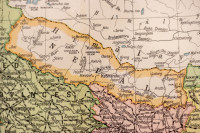Culture & Lifestyle
‘Ghamad Shere’ has everything going for it, but still falls short
The movie has a strong message, and despite its limitations, could open doors in the future for other socio-political dramas..png&w=900&height=601)
Abhimanyu Dixit
When the first Ghamad Shere trailer was released last month, it seemed like an original idea with a great story. There was a second trailer within the next two weeks that felt equally compelling. The plot was summed up as thus: ‘A stubborn man sues the river because it has washed away his land.’
One of the scenes in the trailer introduced us to this stubborn man, who while travelling on a microbus, refuses to pay more than the government-sanctioned fare. He is punished for his stubbornness and is left to literally eat dust by the bus conductor. Judging by that scene alone, this film felt like it was going to be that long-overdue character-driven social drama. The beauty of such films is that they draw us into their world and their beliefs. The audience might not agree with the protagonist all the time, but will definitely empathise with him.
Ghamad Shere has conflicts and dilemmas that are close to life. There are no mountains for the hero to climb, but because this is cinema, there are characters in the story who present our hero with challenges. Usually these challenges amplify as the story progresses.
The titular character, Shere or Sher Bahadur (Nischal Basnet) returns home from Doha to start a farm. He discovers that a local politician, Bhyaguta (Lokendra Lekhak), is selling property beside the river. Shere bargains to buy this piece of land because he believes that the river will irrigate his farm. He obtains the land, and over time, grows good vegetables.
For a while, Shere’s life is good. His wife, Parbati (Sushma Niraula), is happy because he fulfilled her wish to migrate to an urban centre. Shere enrols his son (Bikash Shah) into a better boarding school where Shere’s sister-in-law, Gauri (Swastima Khadka), is an English teacher.
But the season of happiness doesn’t last and the monsoon arrives with ominous thunderstorms and heavy rain. Shere’s beloved plot of land is now engulfed by the river and he discovers that Bhyaguta was aware of this all along. He was cheated. Shere goes to the local law enforcer, Bikash Thapa (Roy Div), to resolve the issue but since Shere approved of the property before buying it, there is little anyone can do.
But Shere is stubborn and he routinely goes to the police station to beg for a solution. When he doesn’t get an appointment, he hangs around the station. Thapa’s subordinate, Hawaldar (Saroj Aryal), suggests that Shere sue the river and Shere duly goes to a lawyer (Rambabu Regmi) for help. The lawyer finds loopholes in Nepal’s newly formed local government and the local judiciary, and bribes bureaucrats to get the job done.
Shere succeeds in suing the river, but because governance is corrupt, things get worse for Shere. And to top it all off, his wife elopes with all of his savings. Then, his son falls ill. Shere is left to die with his alcoholism. His life is a mess.
This is writer-director Hem Raj BC’s seventh film and he’s evolved quite well into a mature storyteller. You can sense that he cares about the film’s social issue. In the film, he makes strong political statements about the government’s policies concerning compensation for flood victims. The issues portrayed are real for Surkhet, BC’s home district.
I am also particularly impressed by the way BC treats the female character, something many Nepali films haven’t been able to do as of late. There are no jokes made at a woman’s expense and neither does the film objectify women. Even the song ‘Sali Mann Paryo’ (I like my sister-in-law), which has been deemed offensive by many, makes sense in the film’s context. You can tell that BC has matured from his earlier days of comparing women to potatoes and puppies (Hostel, 2013).
All that said, there are far too many characters and perspectives in this film. And they’re all half-baked and their scenes go on for way too long. For instance, a side character, Inspector Thapa develops feelings for Gauri and there are scenes where he attempts to ask her out. Gauri smiles at his advances and both of them are polite with each other. Then, he asks Hawaldar to find out if she is seeing someone. Hawaldar reports back that Gauri is neither married or in any relationship. And that’s it. Thapa just sits on the information and there is no follow up. It’s infuriating when you build up to something so meticulously and just don’t follow through.
These underdeveloped scenes could easily have been removed to tighten the film, but for editor Surendra Poudel, meeting the runtime of two hours and fifteen minutes is apparently more important than telling a coherent story.
BC and director of photography Narendra Mainali simply aren’t on the same page either. Mainali is a veteran in Nepali cinema and his work in this film is beautiful, but it doesn’t serve the film. If you freeze individual frames, you will marvel at his composition and lighting but it doesn’t work as a part of the film’s whole.
Many-a-time Mainali’s choices call attention to the cinematography and that distracts from the story. For example, in the scene where Hawaldar suggests that Shere sue the river, the shot is flushed in red light. Here, my mind was thoroughly occupied with the redness rather than content. In another scene, Shere goes home drunk and his wife steps out of the kitchen to meet him. A light source that is way too bright comes from inside the kitchen. It’s as if the kitchen is on fire. Now, these instances wouldn’t have stuck out if the film was consistent with its aesthetic choices. But that’s not the case.
When it comes to BC’s actors, the best performer in the film is Roy Div. His presence on screen is captivating and he effortlessly displays a range of emotions, from his opening angry outburst to his awkward but polite demeanour to a man in love. How such a versatile actor isn’t being offered meatier roles is a travesty. To cast Swastima as a reel life sister-in-law to her real-life husband Nischal might have seemed like a good idea, or something ‘different’ on paper but it hardly works. Both actors try hard to be consistent with their respective characters but it’s not enough to make us believe that they’re anything except Nischal and Swastima, the real-life couple.
The premise of Ghamad Shere had everything going for it. It’s the kind of story that is almost never told in Nepali cinema, with a cast consisting of famous faces, a seasoned cinematographer and a director with many hits under his belt. It had a strong socio-political message and a handful of brilliant scenes. But even all this couldn’t save the film.
If anything, this is an example of how films that look great on paper can go terribly wrong in the execution. We might never know what exactly went wrong but hopefully the film has opened doors to more character-driven social dramas—the kind where the audience, along with the characters, achieves a much-needed catharsis.
Ghamad Shere
Nischal Basnet, Swastima Khadka, Roy Div
Writer/ Director: Hemraj BC
2.5 out of 5




 10.66°C Kathmandu
10.66°C Kathmandu















